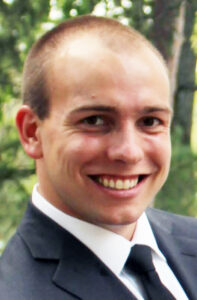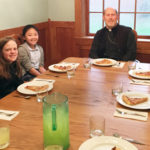By Patrick Schmadeke
(Conclusion of a six-part series on political conscience formation.)
The first article of this series, published in September, opened with the question: “what does it mean to be a responsible Catholic citizen in the midst of rising political polarization?” The question has not lost its relevance in the intervening months. By the time this article is published, the results of the Feb. 3 Iowa caucus will be in and the race leading up to the November elections will be on its way to the New Hampshire primary.

As citizens of a society where news cycles are more likely to induce whiplash than well-discerned perspectives and many political leaders appear more interested in arousing division than in stimulating reconciliation, we need to articulate anew what it means to have a Christian political identity. This need is not merely as a response to our heated political moment. Rather, our collective baptismal calling includes the nurturing of a well-formed conscience, which in turn, enables Catholics to contribute more effectively to the common good in the civic sphere.
So, how do we form our political consciences well? At the least, the following three interrelated efforts are necessary:
Create structures for encounters. This first effort offers a vision for how political conscience formation takes place in the communities to which we belong. One’s parish and home life, work place and educational institutions, for example, play an indispensable (and inescapable) role in conscience formation. To varying degrees, these settings form our consciences well or they form our consciences poorly. We need to attend to how each of these settings form us, and how they can better contribute to the body politic. We fulfill this by scrutinizing and implementing systems, programming and relationships that bring people of different perspectives together into constructive political and civic discourse. Over time, genuine encounters can inspire mutual growth.
Immersion in the Catholic intellectual tradition. Our age is not the first to experience political turmoil, so the second effort draws on documents and models of civic engagement from our tradition. Figures such as Ambrose of Milan, Dorothy Day, Elizabeth Ann Seton and Francis of Assisi are among innumerable witnesses to the principles toward which we must collectively aspire. Documents such as the U.S. Conference of Catholic Bishops’ Forming Consciences for Faithful Citizenship and Faithful Citizenship for Iowa Catholics should be thoughtfully examined in the context of communal discourse to see what riches they have to offer. Labor intensive as such efforts may be, we have the opportunity to immerse ourselves in the Catholic intellectual tradition. Such an effort grounds us in timeless Christian values that speak to our present needs. Also, the Gospels. They speak unceasingly of an inversion of societal power dynamics where those on the margins come to the center of our experience, understanding, judgments and decisions.
Engagement with the Holy Spirit. This third effort is a fuller theological account of the role of the Holy Spirit in the formation of our political consciences. While we are formed in community, and our priests, pastors, spiritual directors and others play an intentional role in facilitating our formation, the church is clear that the primary agents in our formation are the individual and the Holy Spirit. What does this mean? It means that we are personally responsible for actively engaging with the Holy Spirit in prayer in the lifelong process of conscience formation. If we are able to discern the movement of the Holy Spirit in our own lives while simultaneously recognizing the Holy Spirit in the lives of those with whom we disagree, we will be poised to discern avenues towards the common good.
An articulation of how our communities can better facilitate political conscience formation, learning from the riches of our tradition and a theological account of the role of the Holy Spirit, provides the very foundation for conscience formation. If the state of our society is any indication, then the need to inaugurate efforts towards political conscience formation is not just an urgent one, it is an appealing one.
(Editor’s note: Patrick Schmadeke is a graduate of St. Ambrose University (‘13) and a student in the Master of Divinity program at the University of Notre Dame. His column offers reflections on the richness of the Catholic Tradition and its relevance to the world today.)











